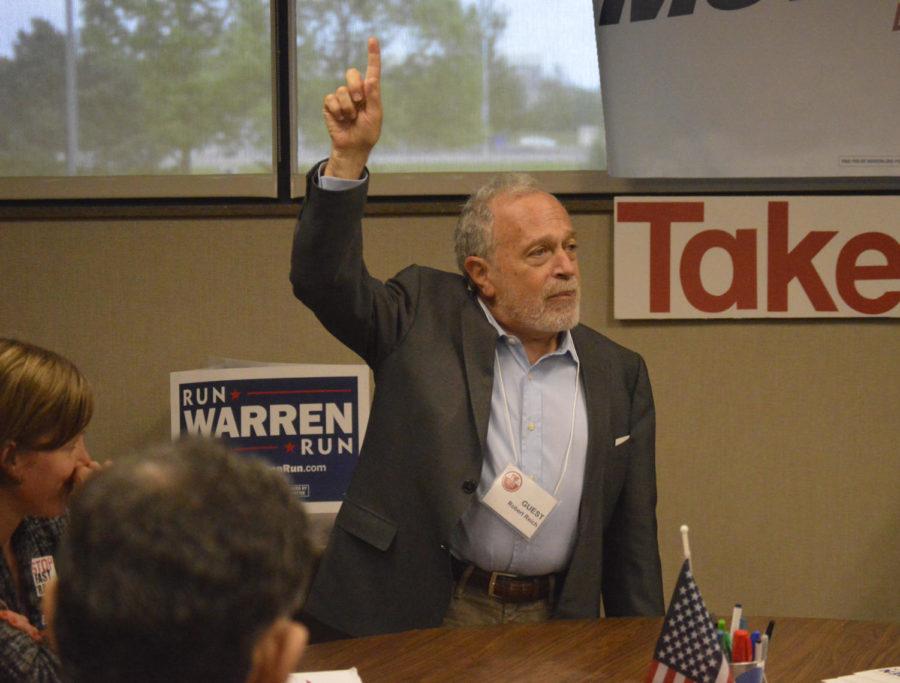Robert Reich urges voters to ask tough questions, push for a progressive agenda
Matthew Rezab/Iowa State Daily
Former U.S. Secretary of Labor Robert Reich speaks to a group from Moveon.org in the Scheman Building Saturday, May 16. Reich was the keynote speaker later in the day at the Working Families Summit.
May 17, 2015
The audience listening to Robert Reich, Bill Clinton’s former secretary of labor, was as engaged as kindergartners on the first day of class at the Working Families Summit at the Scheeman Building on May 16.
Reich stands at only 4 feet 11 inches and was comfortable peppering in jokes about his height while discussing the serious problems facing the American working class in today’s economy. He also encouraged audience participation during his keynote speech.
“As you can see, the economy has worn me down,” Reich said at the beginning of his keynote speech to laughter from the crowd.
The Summit had booths from unions, progressive and democratic organizations, although organizers said it was not a partisan event. Reich hosted a question and answer series during a break-out session at the summit.
“It’s not republicans we are against, it’s regressives,” Reich said during the session and his keynote speech.
He defined regressives as people who want policies similar to those seen before the Great Depression. Reich said the middle class is shrinking and most of the economic gains in America are going to the country’s richest people, and the money the top 1 percent of earners are making is being invested into elections to rig the rules in favor of the rich and against the middle class.
Reich, an economics professor at the University of California, Berkeley made a documentary in 2013 called “Inequality for All,” detailing his findings and beliefs on the current state of the U.S. economy.
“I do have a great deal of confidence in the young generation,” Reich said. “And I do spend a lot of time trying to educate people about what their choices are, trying to overcome apathy, get them engaged and involved.”
Reich said it is easy to see what has happened as a result of the demise of labor unions.
“We have a collective amnesia in this country about what unions actually did for the middle class. Most people who came into the workforce starting in the late ’30s and the ’40s and the 1950s and even the 1960s benefitted enormously from what unions provided, and younger people just forget that,” Reich said. “They’ve allowed unions to be demonized by the groups that have every interest in shrinking the labor movement.”
Reich said the results of declining labor unions has been stagnant wages, declining wages, declining household incomes, declining pensions, fewer benefits and less job security.
Recent graduate from Iowa State University, David Parkinson, said Reich was inspiring, and even though he was speaking to a crowd of 200 people, he said it felt like a one-on-one conversation.
“All the lectures were really interesting. One thing I’ve noticed with all of the lectures is they always give their sources, which is really important,” Parkinson said.
Reich said the fact that many Republican presidential candidates have admitted the middle class is shrinking and Hillary Clinton, in her campaign announcement video, said the deck is stacked in favor of those at the top is a step in the right direction.
Reich has known both Hillary and Bill Clinton since college and said he is a good friend of U.S. Sen. Elizabeth Warren (D-Mass.) and U.S. Sen. Bernie Sanders (I-Vt.). He said he is glad Clinton and Sanders are running for president and would love to see Warren run for the sake of bringing more debate to the progressive side of the election process.
“We have 11 Republican, you know, clown cars … and all we are going to hear for the next year is this nonsense coming out of the Republicans. And if we don’t have a Democratic debate about what’s really important, we’re not going to hear [about] it,” Reich said during the question and answer session.
The total student loan debt burden in America is $1.2 trillion. Of that total, $1 trillion is federal student loan debt, according to the Consumer Financial Protection Bureau.
“A $1.2 trillion debt is not only a drag on the economy, it’s bad for students. At the very least, we ought to allow students to refinance that debt,” Reich said. “Many students are now paying 10, 12, 13 percent when you can get a loan from a bank at 3 percent or at least 3.5 percent.”
Reich said he believes a better solution is to have students agree to pay a percentage of their income when they land a full-time job after college. He suggested students who faithfully pay that percentage should have their loans forgiven after 10 years regardless of the remaining balance.
Reich also advocated for legislation to force corporations to reveal all of their campaign donations, enforcement of anti-trust legislation and the expansion of Social Security.
Reich said Iowans have a unique opportunity to ask politicians questions that really make a difference in people’s lives during the next eight months before the Iowa Caucuses.







